HRC56: Advancing Human Rights and Resilience for Internally Displaced Persons
56th Session of the Human Rights Council
18 June – 12 July 2024
Item 3: Promotion and Protection of all Human Rights, Civil, Political, Economic, Social and Cultural Rights, including the Right to Development
21 June 2024
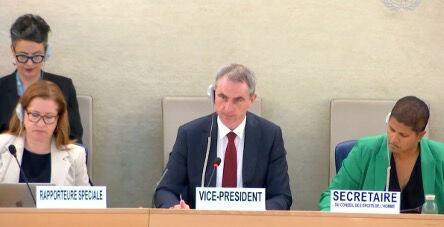
By Marisa Were / GICJ
Executive Summary
During the 7th and 8th meetings of the 56th Session of the Human Rights Council (HRC) on 21 June 2024, Ms Paula Gavira Betancur, the Special Rapporteur on Internally Displaced Persons (IDPs), engaged in an interactive dialogue. Ms Paula highlighted in her reports the increasing global crisis of IDPs. She shared statistics indicating that by the end of 2023, the number of IDPs had risen to 68.3 million, representing a 49% increase over the last five years, primarily driven by conflicts and frequent natural disasters. Notable regions with significant displacement increases include Gaza, Sudan, Haiti, and Myanmar.
Ms Betancur presented two reports: one detailing her country 'Visit to Mozambique' (A/HRC/56/47/Add.1) and one on 'Planned Relocations of People in the Context of Disasters and the Adverse Effects of Climate Change' (A/HRC/56/47). The first report on Mozambique emphasised the urgent need to address the root causes of displacement and implement climate adaptation and mitigation measures. The country report highlighted the progress and ongoing challenges in managing over 1.2 million IDPs who have been displaced due to conflict and climate emergencies. Despite some returning to their homes, many are still relying on humanitarian aid, facing food insecurity and protection issues, which are further worsened for vulnerable groups, such as women and children.
In her second report, Ms Betancur used thematic studies to highlight the complexities of planned relocations due to climate change. It was made clear that relocation should always be the last resort and that the rights and needs of affected communities should be respected. The report stressed the importance of a human rights-based approach to planned relocations, ensuring dignity and sustainability for displaced populations. Ms Betancur emphasised that collaboration among governments, international organisations, and the private sector is crucial for supporting these efforts and promoting resilience amidst climate challenges.
The delegation from Mozambique highlighted the country's advancements since the Special Rapporteur’s visit. They informed participating States that Mozambique had ratified the Kampala Convention and introduced measures to aid IDPs. Furthermore, the country has undertaken initiatives to revise the 1997 Land Law of Equality, establish a management system for IDPs, create an Environmental and Social Safeguards System, and launch a humanitarian assistance hotline.
During the interactive dialogue, some States shared opinions and questions. Some emphasised the need for a comprehensive strategy for planned relocations due to climate change. Many agreed with the Special Rapporteur that it should be a last resort and should align with international standards. Others called for better climate adaptation and attention to the rights of indigenous and vulnerable groups during relocations. Some highlighted the impact of other countries' actions on climate-induced displacement and called for accountability. A few States stressed the importance of integrating IDPs issues with sustainable development goals and climate solutions. At the same time, other States highlighted the combined impact of conflict and climate change on displacement.
On the other hand, several Civil Society Organisations (CSOs) criticised inadequate government responses to environmental displacement. They highlighted the increased risk of nuclear disasters due to climate change and called for better long-term care for IDPs. Some CSOs also expressed concerns about the displacement of Palestinians due to the Israeli-Palestinian War, emphasising the need for environmental and human rights protections.
Geneva International Centre for Justice (GICJ) expresses gratitude to the Special Rapporteur for her comprehensive reports and urges immediate and coordinated action to address the escalating crisis of Internally Displaced Persons, which is rapidly increasing globally. This significant rise, fuelled by conflicts and natural disasters, necessitates urgent climate adaptation and mitigation efforts. GICJ advocates for a transparent human rights-based approach to planned relocations, emphasising that such measures should be a last resort and must respect the dignity of displaced communities.
Background
Internally Displaced Persons often face discrimination and obstacles that prevent them from thoroughly enjoying their human rights due to their displacement. To address this, a specific mandate was created. Firstly, the mandate aims to integrate the human rights of the internally displaced into all relevant parts of the United Nations (UN) system. This mainstreaming effort is crucial for ensuring that the needs and rights of displaced persons are considered across various UN initiatives.
Secondly, the mandate seeks to strengthen the international response to internal displacement caused by armed conflict, general violence, human rights violations, and disasters. By focusing on these areas, the mandate works to improve the overall international approach to managing and resolving internal displacement.
Thirdly, the mandate also involves coordinated international advocacy and action to enhance the protection and respect for the human rights of IDPs. This includes engaging in inclusive dialogue with governments, intergovernmental organisations, regional bodies, non-governmental organisations (NGOs), and other relevant actors for a collaborative approach to addressing the needs of displaced persons.
The mandate was most recently renewed in 2022 through Resolution A/HRC/RES/50/6, reflecting the ongoing international commitment to addressing the challenges IDPs face.
Reports of the Special Rapporteur on the Human Rights of Internally Displacement Persons
Overview
The Special Rapporteur provided two reports on the Human Rights of Internally Displaced Persons. The first report was on the country ‘Visit to Mozambique’ (A/HRC/56/47/Add.1), and the second report was on 'Planned Relocations of People in the Context of Disasters and the Adverse Effects of Climate Change' (A/HRC/56/47).
Visit to Mozambique
Introduction
The Special Rapporteur visited Mozambique from November 9 to 21, 2023, with the objectives of gathering first-hand information on the internal displacement situation in Mozambique, consulting with the Government, national and provincial authorities, and other critical national and international stakeholders and IDPs, and identifying protection concerns facing IDPs and opportunities for durable solutions.
Mozambique has been affected by internal displacement due to disasters exacerbated by the adverse effects of climate change, resource extraction projects, and armed conflict. The global climate crisis has amplified the frequency of recurrent natural hazards such as droughts, heavy rains, and tropical storms, leading to significant consequences for rural communities, which are always the most affected.
Conflict Induced Displacement
Since 2017, due to the ongoing armed conflict and violence by non-state armed groups (NSAGs), the Province of Cabo Delgado has faced large-scale internal displacement, which has led to civilian casualties, infrastructure destruction, loss of livelihoods, and severe violations of international human rights and humanitarian law. Moreover, the situation was further exacerbated by the lack of basic infrastructure and services, poverty, unemployment, and social inequality due to pre-existing disparities between the south and north of the country.
Climate-Induced Displacement
Mozambique faces the recurring challenge of displacement in the context of disasters and climate change. The report noted that the movements of IDPs into settlement sites were not always based on the condition that IDPs have access to essential services in the IDP relocation sites or nearby urban settlements. Moreover, it was noted that there is no comprehensive relocation plan to ensure that relocations are carried out in line with protection standards and principles and from a durable solutions perspective from the onset to avoid secondary displacement and new humanitarian needs.
Conclusion
At the end of the report, the Special Rapporteur provided various recommendations in different categories: overall protection and response strategy, legal, policy, and institutional framework, protection and access to justice, durable solutions, and extractive industry. Some recommendations from the report include:
- Ensuring the protection and safety of IDPs through human rights monitoring and unimpeded humanitarian access.
- Incorporating the provisions of the Kampala Convention to develop and strengthen the legal and policy frameworks on internal displacement.
- Ensure the safety and security of internally displaced persons with a special focus on vulnerable groups.
- Ensure the physical safety in return areas, including by investing in the reconstruction and development of conflict-affected areas to enhance safety, livelihood opportunities, and access to basic services.
- Provide support for establishing and reinforcing protection mechanisms to ensure the safety and security of IDPs.
Planned Relocations of People in the Context of Disasters and the Adverse Effects of Climate Change
Introduction
In this report, the Special Rapporteur provided information on activities conducted from August 2023 to April 2024, focusing on the planned relocation of people in the context of disasters and the adverse effects of climate change. The impact of this can be seen in ongoing humanitarian crises within several countries, including the Occupied Palestinian Territory, the Democratic Republic of Congo, Haiti, Myanmar, Sudan, and Ukraine.
In the report's context, ‘planned relocation’ refers to the process in which groups of persons move or are assisted in moving away from their homes, settle in a new location, and are provided with the conditions to rebuild their lives. It is mainly undertaken to protect people from risks and impacts related to disasters and environmental change, including the effects of climate change, and is carried out under the authority of the State within national borders.
Planned Relocations of People in the Context of Disasters and the Adverse Effects of Climate Change
Around 70% of IDPs are in fragile or conflict-affected States that are particularly vulnerable to the adverse effects of climate change. Therefore, according to the report, the priority should be on climate adaptation and mitigation measures, as well as disaster prevention, to keep human settlements intact whenever possible. Relocation should only be used as a last resort, if necessary, to protect life and health and based on consultation with affected communities or at their request.
Applicable Legal and Policy Frameworks
According to Principles 7 (3), 15, 18, 20, and 28, it is the primary responsibility of States to respect, protect, and fulfil the human rights of IDPs, provide assistance, and establish the conditions for durable solutions. This can be done through a range of instruments. For example, regional instruments such as the Pacific Regional Framework on Climate Mobility and the African Union Convention for the Protection and Assistance of Internally Displaced Persons. As well as national Instruments, whereby, as of 2024, six countries have developed a national instrument on planned relocation in the context of disasters and the adverse effects of climate change.
Impact of Planned Relocations on Human Rights
Relocated individuals and communities often experience negative impacts on their human rights. Many may not have fully recovered from their losses years after relocation. Sometimes, communities are not consulted about relocation; many report a lack of consultation, limited information justifying the relocation, and insufficient knowledge of the process. It is crucial to consult with participating communities in the relocation process, including the relocated community and the communities they are entering. Other impacts involve the right to life, liberty, and security, as some relocated individuals encounter tensions, violence, and conflict with surrounding communities. Rights affected include access to water and sanitation, land, livelihoods, education, health, adequate housing, and indigenous and cultural rights.
Conclusion
The report concluded that implementing planned relocations effectively requires a government-led and whole-of-society approach with human rights-based frameworks developed that follow international human rights norms and standards. It provides recommendations for States, national human rights institutes, civil society organisations, regional and international organisations, United Nations bodies and agencies, and international financial institutions. Some of these include:
- Guarantee in law, policy, and practice the liberty of movement and the freedom to choose one’s place of residence.
- Develop standard operating procedures to implement planned relocation policies.
- Provide financial resources and technical expertise for the development of national legal and policy frameworks to protect people at risk.
- Allocate a greater share of climate finance to climate adaptation and address gaps in access to climate finance funding.
Interactive Dialogue
Opening Statement
Ms Betancur, the Special Rapporteur on the Human Rights of Internally Displaced Persons, began by stating that in 2023, the number of IDPs reached new records, with tens of millions of people displaced due to ongoing conflicts, frequent natural disasters, and a lack of accountability for human rights violations. By the end of 2023, 68.3 million people were internally displaced due to conflict and violence, a 49% increase over the past five years (2019–2024). In recent months, there has been growing frustration expressed about the human rights violations in Gaza, Haiti, Sudan, and Myanmar, among other regions. In the case of Gaza, nearly 83% of its population is dis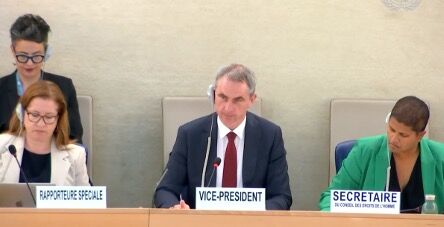 placed, with 70% without homes to return to. In Sudan, there are 1.9 million IDPs, with the number of IDPs in Haiti having more than doubled since 2022. Concerning Myanmar, a vast majority of 3 million IDPs remain without shelter, food, and water.
placed, with 70% without homes to return to. In Sudan, there are 1.9 million IDPs, with the number of IDPs in Haiti having more than doubled since 2022. Concerning Myanmar, a vast majority of 3 million IDPs remain without shelter, food, and water.
Then, Ms Betancur stated that 7.7 million people were internally displaced due to floods, storms, earthquakes, wildfires, and other disasters. However, this number does not include those displaced by slow-onset disasters like sea level rise and environmental degradation. Ms Betancur clarified that climate change is a critical factor exacerbating these disasters, making communities vulnerable. Therefore, addressing the root causes of displacement and implementing climate adaptation and mitigation measures is increasingly urgent. Nevertheless, Ms Betancur reminded delegations and NGOs that behind these numbers are individuals with stories of resilience and hope, which means their voices must be heard and their rights protected. Thus, further highlighting the need to prioritise concrete actions to translate commitments into tangible outcomes for IDPs.
Following her introduction, the Special Rapporteur discussed her visit to Mozambique. During this visit, she noted that the country has made significant progress in addressing these situations, as in 2023, more than 600 people returned to their areas of origin. She also noted that it is clear that Mozambique is committed to the UN Secretary-General’s Action Agenda for IDPs, which is a positive step towards ensuring durable solutions. However, the work does not stop there, as challenges persist for the internally displaced and the returnees. In Northern Mozambique, the humanitarian response is shifting towards reconstruction, integrating humanitarian and peacebuilding efforts to address critical protection needs in affected and underserved areas. Many IDPs in Mozambique also still rely on humanitarian aid due to challenges in accessing agricultural land. Significant issues that still persist are food insecurity and protection from gender-based violence (GBV), which disproportionately affects women, girls, children, and people with disabilities.
Ms Betancur then discussed her second report, which focuses on the planned relocation of people in the context of disasters and climate change. She noted that internal displacement due to disasters is expected to increase as climate change intensifies. Currently, 70% of IDPs are in fragile or conflict-affected States that are particularly vulnerable to climate change. Regardless of this, States need to remember that people have the fundamental right to stay in their homes or return after displacement, which means it is the responsibility of States to develop climate adaptation measures and disaster prevention to maintain human settlements. Ms Betancur emphasised that relocation should only be considered a last resort, based on the consultation with affected communities or upon their request, and only under unavoidable and necessary circumstances. This is because forced relocation constitutes internal displacement and is prohibited by international and regional instruments, including the UN Guiding Principles. She employed authorities to explore all alternatives to relocation and displacement.
A regional instrument of note mentioned was the 2023 Pacific Regional Framework on Climate Mobility, which recognises the right to remain in place as fundamental, as it considers that relocation should be a last resort and carried out safely, dignifiedly, and timely. Additionally, the Kampala Convention, another regional instrument mentioned, instructs States to comply with early warning systems and implement disaster risk measures in potential displacement areas. Ms Betancur congratulated that several States have adopted national instruments for planned relocation but noted that consistent implementation, institutional capacity, and adequate funding are often lacking.
In her conclusion, the Special Rapporteur outlined essential elements of a human rights-based approach to planned relocation, which often harms IDPs and is frequently overlooked. The right to self-determination, cultural identity, and control over land and resources are a few of the rights that must be respected at all times. For example, Indigenous people and other affected groups should be informed, consulted, and involved in decision-making, with their agency and specific needs addressed. Therefore, planned relocations should aim to improve and restore the living standards of relocated people and maintain or enhance those of local populations. There are many international and regional organisations and the private sector that should support these efforts by providing technical, financial, and capacity-building assistance to prevent displacement, enhance resilience, and promote sustainable development.
Statement of the Concerned Country: Mozambique
 The Mozambique delegate provided an update on the progress made regarding the human rights of IDPs in Mozambique since the Special Rapporteurs' visit.
The Mozambique delegate provided an update on the progress made regarding the human rights of IDPs in Mozambique since the Special Rapporteurs' visit.
First, he emphasised that the country had recently ratified the Kampala Convention and had taken several internal measures to implement it. The process involved various stakeholders, including government actors and the private sector. Then, regarding the right to land, the Ministry of Justice is currently reviewing the 1997 Land Law to ensure that IDPs are included as citizens who should benefit from land deeds. This revision ensures compliance with the constitutional requirement of equality for all citizens before the law.
Secondly, the government has established a mechanism to ensure humanitarian assistance to IDPs, including a hotline for receiving and following up on assistance requests. This aligns with the 2021 Environmental and Social Safeguards Sys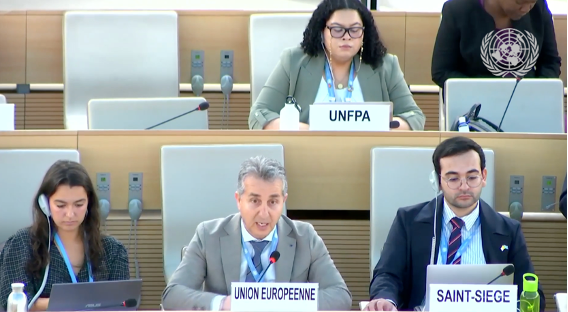 tem set up at the Institute of National Disaster Management, which aims to address the dynamic challenges of disasters and develop social and economic activities and other safeguards.
tem set up at the Institute of National Disaster Management, which aims to address the dynamic challenges of disasters and develop social and economic activities and other safeguards.
Additionally, efforts are underway to provide identification cards for IDPs. Moreover, the national assembly has approved a law protecting persons with disabilities, and the Minister of Justice has conducted campaigns focused on protecting IDPs as part of the recommendations on protection and access to justice. Finally, a technical working group for IDPs has been established to work on durable solutions, including cooperation with State partners.
Delegates of Participating Countries
The European Union expressed appreciation for the report as it addressed crucial issues of planned relocation of people in the context of the adverse effects of climate change and disasters, considering that according to the International Displacement Monitoring Centre (IDMC), by the end of 2023, the number of IDPs worldwide reached a new record high of 75.9 million, with 68.3 million displaced by conflict and violence and 7.7 million by disasters. The delegate of the European Union noted that the report highlighted the multifaceted nature of planned relocations, underscoring the importance of adopting a comprehensive strategy that prioritises community needs, mitigates displacement risks, protects human rights, and seeks durable solutions. He agreed with the Special Rapporteur that relocation must remain a last resort and should only be used when other methods are unsustainable. Moreover, the European Union recognised that States are primarily responsible for ensuring unavoidable relocations are always carried out per applicable international standards, including those set out in the UN guiding principles. This led to the delegate asking, ‘How can States help advocate for greater attention to the protection of human rights of IDPs in the ongoing humanitarian crises?’.
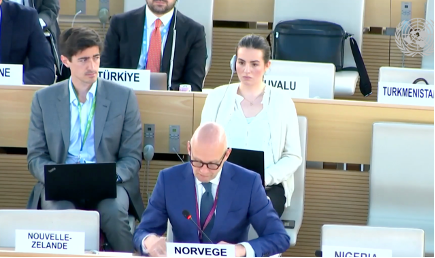 The delegate from Norway, speaking on behalf of the Nordic-Baltic Countries, thanked the Special Rapporteur for her strong engagement with IDPs and her report. He then emphasised the need to enhance efforts in climate adaptation, building resilience, and disaster prevention to prevent displacement due to climate change. In addition, the delegate stressed that governments must ensure relocations are well-planned, consistent with human rights standards, and based on an integrated approach, as these should be the foundation for durable solutions. It is imperative that measures be taken to protect groups with a particular dependency on their lands, and potential barriers to land tenure and resource conflicts in relocation areas should be addressed. Norway also stated that it is crucial to establish a conducive environment for an inclusive and sustainable livelihood for the IDPs, as planned relocations might, in particular, negatively impact Indigenous people, therefore requiring specific attention to ensure their rights and cultural identity are preserved. To conclude, the delegate of Norway asked, ‘How can best practices be shared to ensure that relocations are conducted without discrimination and align with human rights safeguards and principles?’.
The delegate from Norway, speaking on behalf of the Nordic-Baltic Countries, thanked the Special Rapporteur for her strong engagement with IDPs and her report. He then emphasised the need to enhance efforts in climate adaptation, building resilience, and disaster prevention to prevent displacement due to climate change. In addition, the delegate stressed that governments must ensure relocations are well-planned, consistent with human rights standards, and based on an integrated approach, as these should be the foundation for durable solutions. It is imperative that measures be taken to protect groups with a particular dependency on their lands, and potential barriers to land tenure and resource conflicts in relocation areas should be addressed. Norway also stated that it is crucial to establish a conducive environment for an inclusive and sustainable livelihood for the IDPs, as planned relocations might, in particular, negatively impact Indigenous people, therefore requiring specific attention to ensure their rights and cultural identity are preserved. To conclude, the delegate of Norway asked, ‘How can best practices be shared to ensure that relocations are conducted without discrimination and align with human rights safeguards and principles?’.
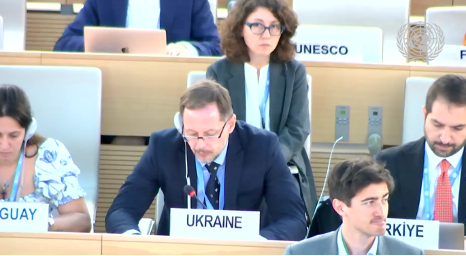 The delegate of Ukraine spoke on behalf of Lithuania and Poland. He stated that climate-induced internal displacement poses complex challenges worldwide and significantly impacts human rights by jeopardising access to essential services such as health care, education, and housing. Focusing his statement on Ukraine, he observed that for the country, there is a multifaceted connection between internal displacement and environmental challenges, which have been exacerbated by Russia’s massive and deliberate attacks on critical infrastructure. June 2024 marked one year since Russia destroyed the Kakhovka Dam, leading to one of the biggest environmental catastrophes in Europe, whereby tens of thousands of people were displaced and affected by flooding, damaged irrigation, loss of livelihood, and lack of access to clean water. The delegate of Ukraine called for Russia to be held accountable for their actions and posed the question to the Special Rapporteur, asking, ‘Is there a way to strengthen the resilience and self-reliance of IDPs facing such challenges to prevent further displacement?’.
The delegate of Ukraine spoke on behalf of Lithuania and Poland. He stated that climate-induced internal displacement poses complex challenges worldwide and significantly impacts human rights by jeopardising access to essential services such as health care, education, and housing. Focusing his statement on Ukraine, he observed that for the country, there is a multifaceted connection between internal displacement and environmental challenges, which have been exacerbated by Russia’s massive and deliberate attacks on critical infrastructure. June 2024 marked one year since Russia destroyed the Kakhovka Dam, leading to one of the biggest environmental catastrophes in Europe, whereby tens of thousands of people were displaced and affected by flooding, damaged irrigation, loss of livelihood, and lack of access to clean water. The delegate of Ukraine called for Russia to be held accountable for their actions and posed the question to the Special Rapporteur, asking, ‘Is there a way to strengthen the resilience and self-reliance of IDPs facing such challenges to prevent further displacement?’.
The United Nations Development Programme (UNDP) stated that 26 years after the Commission on Human Rights adopted the Guiding Principles on Internal Displacement, t hey remain the most widely recognised standards. However, over the last five years, the number of IDPs worldwide has increased to a record high of over 75 million. UNDP stated that it is clear that IDPs can go years without basic and essential services, protection, or decent work, and some are unable to exist as equal-rights citizens in their communities. This is why UNDP stated that they will continue to promote development solutions to internal displacement. UNDP would be pleased to partner with the Special Rapporteur to ensure that the link between solutions to internal displacement and meeting key Sustainable Development Goals (SDGs), such as ending poverty, is cemented.
hey remain the most widely recognised standards. However, over the last five years, the number of IDPs worldwide has increased to a record high of over 75 million. UNDP stated that it is clear that IDPs can go years without basic and essential services, protection, or decent work, and some are unable to exist as equal-rights citizens in their communities. This is why UNDP stated that they will continue to promote development solutions to internal displacement. UNDP would be pleased to partner with the Special Rapporteur to ensure that the link between solutions to internal displacement and meeting key Sustainable Development Goals (SDGs), such as ending poverty, is cemented.
The delegate of Canada recognised that climate change contributes to the increased frequency and severity of extreme weather events such as droughts, ecosystem degradation, and food shortages worldwide. All of this is leading to significant humanitarian ne eds and the loss of hard-won development gains for some, if not all, States. She stated that this further profoundly impacts billions of people's enjoyment of human rights. The effects of climate change frequently intersect with other factors that can drive migration and displacement, such as food insecurity, economic instability, political tensions, conflict, and violence. Additionally, putting at risk, in particular, vulnerable groups, such as women, children, persons with disabilities, and LGBTIQQ+ individuals. The delegate of Canada expressed that the country is actively collaborating with international partners to address the complex intersection between climate change, migration, and internal displacement, including by supporting the development of targeted climate solutions. To the Special Rapporteur, the question ‘Can you provide examples of policies or practices by which States, businesses, and civil society may help prevent further displacement of people and communities due to climate change?’ was posed.
eds and the loss of hard-won development gains for some, if not all, States. She stated that this further profoundly impacts billions of people's enjoyment of human rights. The effects of climate change frequently intersect with other factors that can drive migration and displacement, such as food insecurity, economic instability, political tensions, conflict, and violence. Additionally, putting at risk, in particular, vulnerable groups, such as women, children, persons with disabilities, and LGBTIQQ+ individuals. The delegate of Canada expressed that the country is actively collaborating with international partners to address the complex intersection between climate change, migration, and internal displacement, including by supporting the development of targeted climate solutions. To the Special Rapporteur, the question ‘Can you provide examples of policies or practices by which States, businesses, and civil society may help prevent further displacement of people and communities due to climate change?’ was posed.
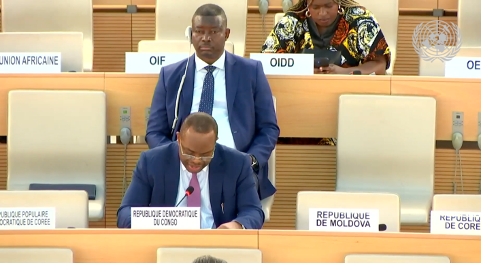 The delegate of the Democratic Republic of Congo mentioned how, over the last few years, the adverse impacts of climate change have led to significant humanitarian challenges, to which institutions have been set up in response to protect vulnerable populations, mainly through civil protection, humanitarian aid, and legal and judicial assistance. Focusing on his country, the delegate expressed that conflict-induced displacement, which has been a significant issue for some 30 years, is the Democratic Republic of Congo’s primary cause of internal displacement. In 2024, 7,500 people were displaced, adding to the over 7 million IDPs in the country already. The prevailing insecurity in the East, coupled with a lack of resources and climate change-induced disasters, has undermined the rights and fundamental freedoms of the people. Therefore, the delegate stressed that it is essential to mobilise efforts to tackle conflict and protect the environment to address the issue of IDPs effectively.
The delegate of the Democratic Republic of Congo mentioned how, over the last few years, the adverse impacts of climate change have led to significant humanitarian challenges, to which institutions have been set up in response to protect vulnerable populations, mainly through civil protection, humanitarian aid, and legal and judicial assistance. Focusing on his country, the delegate expressed that conflict-induced displacement, which has been a significant issue for some 30 years, is the Democratic Republic of Congo’s primary cause of internal displacement. In 2024, 7,500 people were displaced, adding to the over 7 million IDPs in the country already. The prevailing insecurity in the East, coupled with a lack of resources and climate change-induced disasters, has undermined the rights and fundamental freedoms of the people. Therefore, the delegate stressed that it is essential to mobilise efforts to tackle conflict and protect the environment to address the issue of IDPs effectively.
 The Chinese delegate recognised climate-induced extreme weather events, such as floods and drought, have resulted in security crises and hardships for vulnerable groups, including displaced persons. As the indiscriminate application of unilateral measures by some countries has only exacerbated the impact of climate change on IDPs, therefore the international community should attach high importance to addressing this issue. The delegate said that developed countries should shoulder their historical responsibility by honouring their commitments to provide better financial, technological, and capacity-building support, cease military intervention, and help developing countries that address climate change and its negative impact on IDPs. Since China has accelerated green development plans, it is willing to assist other States in building green infrastructure, promoting green transitions in critical sectors such as energy and transportation, and enhancing their climate response. The delegate concluded by stating that China is ready to work with all parties to protect the human rights of those displaced.
The Chinese delegate recognised climate-induced extreme weather events, such as floods and drought, have resulted in security crises and hardships for vulnerable groups, including displaced persons. As the indiscriminate application of unilateral measures by some countries has only exacerbated the impact of climate change on IDPs, therefore the international community should attach high importance to addressing this issue. The delegate said that developed countries should shoulder their historical responsibility by honouring their commitments to provide better financial, technological, and capacity-building support, cease military intervention, and help developing countries that address climate change and its negative impact on IDPs. Since China has accelerated green development plans, it is willing to assist other States in building green infrastructure, promoting green transitions in critical sectors such as energy and transportation, and enhancing their climate response. The delegate concluded by stating that China is ready to work with all parties to protect the human rights of those displaced.
 The delegate of Panama acknowledged that due to its geographical location, Panama is also a victim of these realities. The country is exposed to rising sea levels and extreme climate events, which threaten the infrastructure of coastal communities, including indigenous people and ecosystems. Recent studies indicate that by 2050, islands will disappear due to coastal flooding, necessitating the relocation of people. The delegate agreed with the Special Rapporteur that planned relocations should be a tool of last resort and require a comprehensive framework, with priority given to the needs of affected persons. They asked the Special Rapporteur, ‘Do you believe that there are legal gaps in the protection area in this respect, or is it rather a lack of implementing these durable frameworks?’
The delegate of Panama acknowledged that due to its geographical location, Panama is also a victim of these realities. The country is exposed to rising sea levels and extreme climate events, which threaten the infrastructure of coastal communities, including indigenous people and ecosystems. Recent studies indicate that by 2050, islands will disappear due to coastal flooding, necessitating the relocation of people. The delegate agreed with the Special Rapporteur that planned relocations should be a tool of last resort and require a comprehensive framework, with priority given to the needs of affected persons. They asked the Special Rapporteur, ‘Do you believe that there are legal gaps in the protection area in this respect, or is it rather a lack of implementing these durable frameworks?’
The delegate of Afghanistan welcomed the report and stated that at the end of 2023, a total of 6.3 million people in Afghanistan were internally displaced due to conflict, violence, and climate-related disasters. In addition, the recent return of vulnerable people from Pakistan since September 2023 has dramatically increased the number of displaced persons in the country, placing a b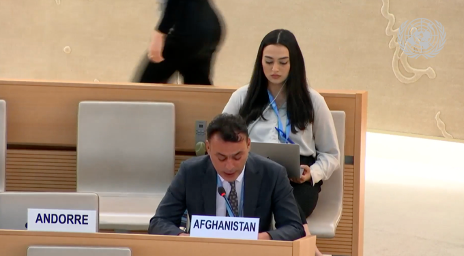 urden on already stretched resources. Moreover, the systematic oppression of women in Afghanistan has exacerbated the vulnerability of female IDPs, who face more significant challenges during displacement. With limited access to education, health care, and employment opportunities, women are further marginalised, making them more vulnerable to violence, exploitation, and abuse. The delegate stressed that it is imperative to act now. He called for the international community to recognise and actively combat the systematic discrimination that exacerbates the plight of IDP women in Afghanistan. Everyone's collective action is crucial to safeguarding their rights and dignity. He expressed that this is not just a plea for help but a demand for justice and immediate action. The delegate concluded by urgently calling for concrete measures from all states and stakeholders involved.
urden on already stretched resources. Moreover, the systematic oppression of women in Afghanistan has exacerbated the vulnerability of female IDPs, who face more significant challenges during displacement. With limited access to education, health care, and employment opportunities, women are further marginalised, making them more vulnerable to violence, exploitation, and abuse. The delegate stressed that it is imperative to act now. He called for the international community to recognise and actively combat the systematic discrimination that exacerbates the plight of IDP women in Afghanistan. Everyone's collective action is crucial to safeguarding their rights and dignity. He expressed that this is not just a plea for help but a demand for justice and immediate action. The delegate concluded by urgently calling for concrete measures from all states and stakeholders involved.
The delegate of Burkina Faso congratulated the Special Rapporteur on the quality of her report. She stated that Burkina Faso has enacted various measures to protect IDPs, particul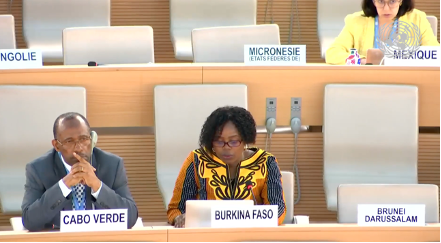 arly those displaced due to climate or natural disasters. To uphold and respect the human rights of these individuals during planned relocations, the government of Burkina Faso adopted Law Number 012/2014, which aims to prevent and, when necessary, manage risks and humanitarian disasters, regardless of their nature, origin, or scale. This means that, in practice, whenever a relocation occurs, the government implements a relocation plan based on human rights principles, aligning with the needs and concerns of both the displaced populations and the host communities. This plan includes considerations for cultural sites and provides compensation for lost land. To conclude, the delegate wished the Special Rapporteur every success with her mandate.
arly those displaced due to climate or natural disasters. To uphold and respect the human rights of these individuals during planned relocations, the government of Burkina Faso adopted Law Number 012/2014, which aims to prevent and, when necessary, manage risks and humanitarian disasters, regardless of their nature, origin, or scale. This means that, in practice, whenever a relocation occurs, the government implements a relocation plan based on human rights principles, aligning with the needs and concerns of both the displaced populations and the host communities. This plan includes considerations for cultural sites and provides compensation for lost land. To conclude, the delegate wished the Special Rapporteur every success with her mandate.
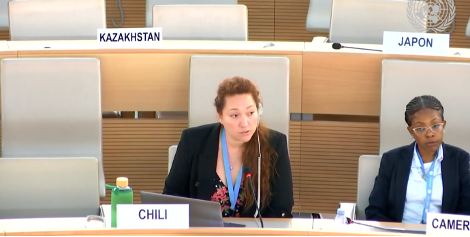 The delegate of Chile extended gratitude to the Special Rapporteur for her valuable contributions during the first and second rounds of the Cartagena +40 consultation process, whereby her input was instrumental in guiding the development of solutions for IDPs in Latin America and the Caribbean. The delegate mentioned that the third round of this process was approaching, focusing on better-supporting refugees and IDPs affected by climate change. Latin America and the Caribbean remain highly vulnerable to climate change, with over 19 million people impacted by extreme weather events and natural disasters. In light of this, the delegate questioned, ‘How can the UN cooperation frameworks for sustainable development contribute to preventing, protecting, and finding lasting solutions for climate and disaster-induced internal displacement?’.
The delegate of Chile extended gratitude to the Special Rapporteur for her valuable contributions during the first and second rounds of the Cartagena +40 consultation process, whereby her input was instrumental in guiding the development of solutions for IDPs in Latin America and the Caribbean. The delegate mentioned that the third round of this process was approaching, focusing on better-supporting refugees and IDPs affected by climate change. Latin America and the Caribbean remain highly vulnerable to climate change, with over 19 million people impacted by extreme weather events and natural disasters. In light of this, the delegate questioned, ‘How can the UN cooperation frameworks for sustainable development contribute to preventing, protecting, and finding lasting solutions for climate and disaster-induced internal displacement?’.
The delegate of the State of Palestine recalled that a major root cause of the Palestinian people's suffering was the 1948 Nakba, during which over 750,000 Palestinians were d isplaced by the Israeli colonial power. Displacement that continues to this day, driven not by climate change but by an Israeli apartheid and ongoing genocide in Gaza. In Gaza, approximately 1.7 million Palestinians are repeatedly forced to flee their homes due to relentless attacks by Israeli forces and settlers. The Independent Commission of Inquiry has reported that this forced displacement in Gaza is “one of the fastest mass displacements in history,” with Israeli evacuation orders used to confine civilians under unliveable conditions. Currently, Israeli forces are intensifying their attacks in Rafah, deliberately targeting the tents of displaced people, leading to extreme violence and suffering, including reports of melting tents and the dismemberment and burning of innocent individuals. The delegate urged the international community to witness these harrowing conditions and reflect on whether they are on the right side of history.
isplaced by the Israeli colonial power. Displacement that continues to this day, driven not by climate change but by an Israeli apartheid and ongoing genocide in Gaza. In Gaza, approximately 1.7 million Palestinians are repeatedly forced to flee their homes due to relentless attacks by Israeli forces and settlers. The Independent Commission of Inquiry has reported that this forced displacement in Gaza is “one of the fastest mass displacements in history,” with Israeli evacuation orders used to confine civilians under unliveable conditions. Currently, Israeli forces are intensifying their attacks in Rafah, deliberately targeting the tents of displaced people, leading to extreme violence and suffering, including reports of melting tents and the dismemberment and burning of innocent individuals. The delegate urged the international community to witness these harrowing conditions and reflect on whether they are on the right side of history.
Civil Society Organisations (NGOs)
There were a few Civil Society Organisations that spoke on general topics of internal displacement and country-specific ones; however, almost every NGO agreed that States should prioritise the long-term care of IDPs who are forced to move due to environmental disasters. Voluntary evacuees have been mistreated compared to those evacuated mandatorily, with some facing accusations of damaging the nation. The risks of climate change, rising sea levels, and extreme weather increase the likelihood of nuclear disasters and displacement, exemplifying the unsustainability of nuclear power and its exacerbation of IDP issues. Many supported the Special Rapporteur’s recommendations and committed to working with national and local actors in Mozambique to advance the protection of internally displaced children’s rights, particularly girls, who should be empowered as agents of change and given meaningful opportunities in decision-making processes. Other NGOs commented that the actions taken by Israel are seen as an attempt to deny Palestinians, especially IDPs in Gaza, their fundamental rights, including the right to reparations and return. Therefore, a few called for UN Member States to establish a committee to investigate and address the long-term environmental impacts and human rights violations resulting from Israel’s actions in Gaza.
Closing Remarks
Response to Questions
Special Rapporteur Ms Paula Gavira Betancur began by thanking the government of Mozambique for accepting the report and providing updates on their recommendations, which she hopes to receive in writing soon. She expressed gratitude to all the States' presentations, comments, and various interventions for supporting the mandate, findings, and recommendations.
Early Warning and Early Actions
Ms Betancur stated that the most proven and cost-effective answer for reducing disaster deaths and losses involves numerous measures States can take for early warning. These include developing national adaptation plans, leveraging innovative technology, hazard monitoring, regional coordination and communication, promoting community involvement and engagement in implementing early warning systems, and training communities and civil society organisations.
Advocating
In this case, the Special Rapporteur informed that States could help by raising visibility and awareness of the specific needs of IDPs related to their displacement at regular forums and national levels. This can be done through promoting legal and policy frameworks, such as the UN Guiding Principles and the Kampala Convention, which are essential. Additionally, States can encourage and support national human rights institutions, which are vital actors in protection, which is also crucial. She said that collaboration with NGOs and humanitarian organisations, as well as research and documentation, are other essential steps.
Concrete Solutions for States to Help People Displaced by Climate Change
Ms Betancur expressed that States can assist by developing legal and policy frameworks to protect the rights of displaced individuals and establishing systems for durable solutions. States must also implement climate change mitigation and adaptation strategies, conduct research and data collection, allocate funding and resources effectively, and train communities on vital measures.
Children and Specific Populations
As Children are one of the most vulnerable groups, the Special Rapporteur recommended that relocation be made more child-friendly through child-centred planning, continuous education, and safe spaces. Keeping families together is crucial. It is also essential to involve all communities, including displaced people and the communities to which they may be relocated or nearby.
Transparency, Accountability and Implementation of States
Additionally, she employed States to ensure transparency and accountability in their actions, as community-led partnerships and collaboration are vital. Land should be legally available, and community involvement is necessary to understand their needs and capacities. States, businesses, and civil society organisations should collaborate to create robust integrated approaches to prevent displacement while developing and building policies. Ms Betancur also noted that existing frameworks and guidelines need to be implemented. She stated that implementing these measures is critical for effectively addressing displacement issues.
Final Remarks
In her concluding statement, the Special Rapporteur stated that working with local actors to protect human rights during planned relocations presents various challenges, such as understanding the local context, limited access and trust within affected communities, and the need for coordinated efforts among all involved actors. Additionally, Security is a critical issue, as are cultural sensitivities, the often inadequate implementation of political and legal frameworks, and the concern regarding transparency and accountability in these processes.
As a last-resort measure, Ms Betancur said it should be directed towards financing planned relocations only when necessary. She encouraged countries to intensify their efforts to mitigate greenhouse gas emissions to prevent unnecessary relocations. This is particularly important for States with limited land use that rely heavily on international support and partnerships to address climate change issues. Lastly, she said NGOs are crucial in monitoring and reporting human rights violations as an essential link between IDPs and local authorities. Their work helps ensure that the rights of displaced persons are upheld and that their voices are heard in the process of relocation and protection.
Position of Geneva International Centre for Justice
Geneva International Centre for Justice (GICJ) urges immediate and coordinated action from the international community and Member States to address the escalating crisis of internally displaced persons. GICJ emphasises the critical need to address the root causes of displacement, including conflicts and environmental disasters, which have led to a dramatic rise in the number of IDPs to 75.9 million by the end of 2023.
GICJ calls for urgent implementation of climate adaptation and mitigation strategies to address the underlying factors contributing to displacement. The report's findings, particularly from the recent visit to Mozambique, underscore the importance of managing IDPs, focusing on human rights, dignity, and sustainability. Despite some progress, the situation remains dire for many IDPs, who continue to face severe food insecurity and protection challenges.
Furthermore, GICJ advocates for a human rights-based approach to planned relocations, urging that such measures only be considered a last resort. Relocations must respect the rights and needs of affected communities, ensuring their dignity and long-term well-being. The international community, governments, and the private sector must work collaboratively to support resilience-building efforts and mitigate the impacts of climate change. This includes increased support for humanitarian aid, more significant efforts in climate action, and a unified approach to ensuring that planned relocations are handled with respect and care for displaced populations. We can only provide practical solutions and improve the conditions for those affected by internal displacement through concrete effort.
#InternallyDisplacedPersons #Relocation #SustianabileDevelopment #Agency #Collaboration #IDPs #ClimateChange #Mozambique #HumanRightsBasedApproach #Geneva #Geneva4Justice #GICJ #GenevaInternationalCentreForJustice







